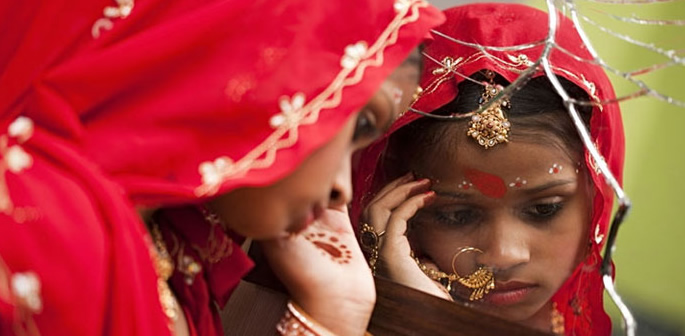"This is a landmark judgement that corrects a historical wrong against girls."
The Indian Supreme Court has delivered a new ruling surrounding those who have sex with a child bride. The rule now classes the act as rape, with police able to charge husbands.
This new, landmark clause was announced on 11th October 2017. It now hails as a monumental step towards child brides getting justice for the sexual abuse they suffer at the hands of their spouse.
India’s Supreme Court explained what this ruling would mean, saying:
“If a man has sexual intercourse with a wife who is below 18 years, it is an offence. The minor wife can complain against the husband within one year.”
Previously the law stated that 18-years-old marked the age of consent. If a man had sex with an underage child, police would charge him with rape. However, the Indian government does not see marital rape as an offence.
In addition, the original clause stated that a man and his wife could have sex, providing she was over 15-years-old. However, this overlooked child brides aged between 15-18 years old. Meaning if their husband forced them into sex, they could not turn to the police.
With this conflict of laws, it meant a rift between the Indian Penal Code (IPC) and the Protection of Children from Sexual Offences Act (POSCO). For example, if a husband had sex with a child bride aged between 15-18, the previous laws wouldn’t class it as rape. But it would class as aggravated penetrative sexual assault under the POSCO Act.
Now, with India’s Supreme Court’s announcement, it puts several legalisations in synch. This includes the POSCO Act, IPC, JJ Act and the Prohibition of Child Marriage Act.
Since the announcement, women activist groups have applauded the Indian Supreme Court’s new ruling. Speaking to the BBC, the founder of Independent Thought Vikram Srivastava said:
“This is a landmark judgement that corrects a historical wrong against girls. How could marriage be used as a criterion to discriminate against girls?” Independent Thought acted as one of the main petitioners for this change in the law.
However, some have argued that the ruling could become difficult to enforce. Despite the progress shown by India’s Supreme Court. Regarding the law, it states that a charge will be made providing a complaint is made to police within a year of the act.
Speaking out on a traumatic experience such as this can often take time for a victim. Especially for those who have been married off by their parents and against their own will. In many cases, they may feel too scared to say anything at all.
With this timeframe of just one year, one could argue whether or not the new ruling will truly make a difference. Only time will tell.
In addition, a correspondent told the BBC:
“Courts and police cannot monitor people’s bedrooms and a minor girl who is already married, almost always with the consent of her parents, will not usually have the courage to go to the police or court and file a case against her husband.”
In India, it’s estimated that the country has 2.3 million child brides. It seems then the issues surrounding minors, rape and forced marriage still have a long way to go.
While the Indian Supreme Court has shown progress with the new law, it contains potential hindrances. But many will hope it acts as the first step towards giving young brides the justice they deserve.




























































